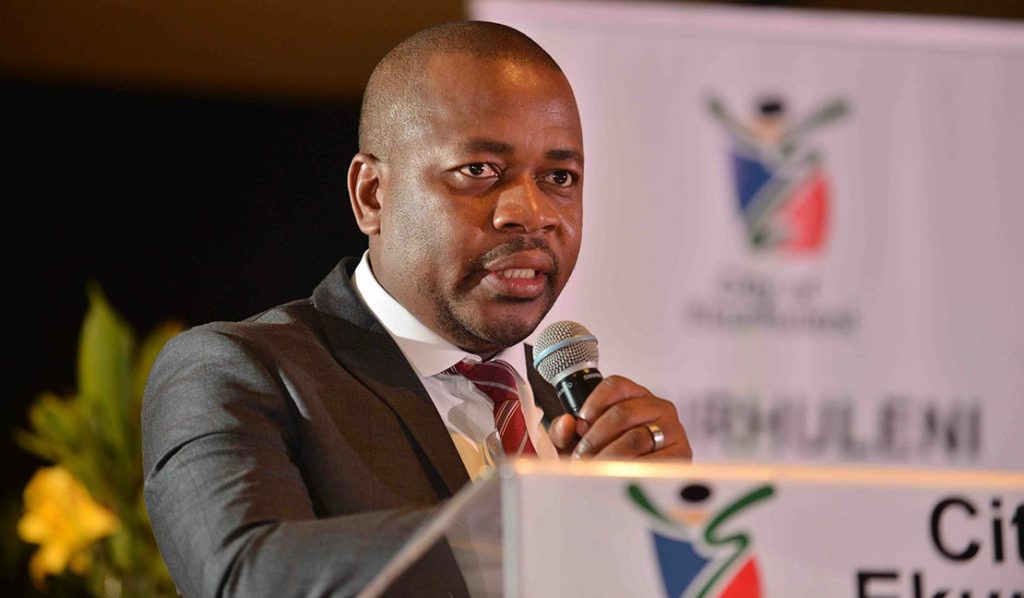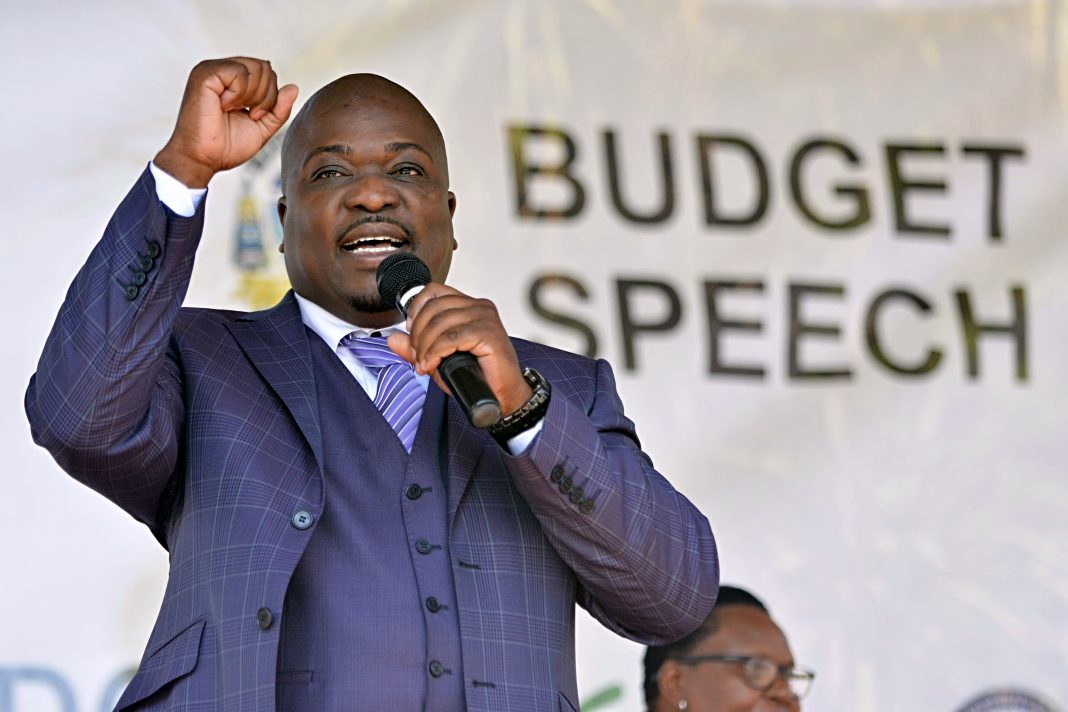THALIA HOLMES
AS THE City of Ekurhuleni Finance and Economic Development Mayoral Committee Member (MMC) Nkosindiphile Xhakaza delivered his 2020 budget speech to a masked audience spaced widely apart in the legislature with several of his colleagues looking on via Microsoft Teams, the moment could not have been more aptly described than the words chosen by the MMC himself: “We have a new normal”.
COVID-19, Xhakaza said, “has had major health, economic and social effects on every human being from here in Ekurhuleni throughout the rest of the world”.
Not least of all for the man in charge of the city’s coffers, those effects have made themselves felt on the city’s finances.
The impact of the lockdown has resulted in a drastic reduction of revenue collection, an increase in accounts disputes, and requests for new payment arrangements and extensions, among others, said Xhakaza.
In addition, the city anticipates a leap in the number of indigent applications due to projected job losses and salary adjustments.
The overall impact? A R1.2 billion revenue loss for the city in the current financial year.
Already strained municipal revenues have taken a further knock, with the MMC stating that the current grant system will not provide municipalities with the financial allocation needed in order to confront the service delivery challenges confronting them. The city needs funds. But, says the MMC, so does its residents.
Softening the blow from the pandemic
So, despite its revenue woes, the city has taken the decision to keep the municipality charges that it has control over, unchanged for the upcoming financial year. This means that assessment rates, sundry tariffs, refuse removal, burial and cemetery costs and municipal bus services will see no cost increases.
Tariffs that are not under the control of the city will, however, be hiked up: the water tariff will climb by 15%, sanitation will likely see an 11% increase, and the city will purchase electricity from Eskom at a 6.9% increase; however, the city will only pass on an increase of 6.23% to the consumer. “This means the city will absorb the difference,” said the MMC.
The city has also put a raft of other relief measures in place for its residents, including payment programmes for those who have lost income due to COVID-19; no interest charged for municipal bills that are in arrears for the six months surrounding the COVID-19 period, and payment incentives for residents to pay outstanding debts, with the city saying in some cases that it will provide discounts to those wishing to square off their debts.
“Ours is to alleviate the pressure, hence we have announced no increases in terms of the property rates,” said Xhakaza in an interview following the budget speech.
“This is to give people an opportunity to come back; to look at turning around their production activities, and to contribute positively to the entire production chain.”
There were painful pay-offs in order to stay within budget though; for example, the city adjusted its medium-term capital expenditure budget of R7.4-billion in the current financial year to R4.9-billion for 2020/21: “a move that has massive impact on the City’s infrastructure delivery programme,” said the MMC.
The city’s Chief Financial Officer Kagiso Lerutla said that they lost about R1-billion in offering this reprieve to residents.
“It means certain capex projects will be deferred, but we thought that in this point in time it’s very important to make sure that the residents are able to service those rates,” he said in an interview after the speech. “It doesn’t make sense to put an increase when you know that it is an artificial increase, because in light of the current economic conditions it’s very difficult for any person to service their current obligations.”

‘We do not spend money we don’t have’
In the wake of the national treasury’s supplementary budget speech, which outlined that the nation’s debt to GDP ratio is expected to rise to 81.1% in the current financial year, the MMC emphasized the city’s desire to avoid similar debt afflictions.
“It must be emphasised that this government will not spend money it does not have, and increasing the level of indebtedness will simply make us vulnerable and threaten our transformation agenda,” said Xhakaza. “Reducing the overall burden of debt to release more resources for development remains our key objective.”
The city will use the almost R37-billion revenue generated internally and the R4.8-billion it receives in grants from the national treasury in order to find its operational expenditure.
Xhakaza highlighted that there would be “no borrowings to fund Opex (operational expenditure).”
The administration has embarked on a wide internal cost-cutting mission to try and balance its books.
“Our approach is to say we want to save jobs for our own employees, but importantly we must also continue to deliver services,” said the MMC after the speech.
In order to drive down costs, “we must look at other issues that are not directly linked to service delivery, issues like travelling, issues like catering … telephone calls or stationery costs; just to ensure that we don’t pass those costs to communities.”
These accounting decisions take place against the city’s boasted back-to-back clean audit findings issued by the Auditor-General.
“We continue to maintain an unqualified audit opinion,” said Xhakaza.
This means “that the quality of information that we report out there is reliable: our communities, the investors, the business communities can look at that information and say indeed this city is reporting according to the set standards, it’s transparent and there’s no hiding of any information.”
Spending priorities
Despite a rein-in on finances, the city will continue to spend in the areas of its priority. First up on that list is its social package, which will increase from R3.8-billion to R4.1-billion for the upcoming financial year.
The package offers things such as free refuse removal, the first 100kWh of electricity free every month and the first 9kilolitres of water and sewage free, to indigent residents.
Other spending highlights earmarked for 2020/21 include:
- R116.6-million in the next financial year is allocated to economic development projects such as the Reiger Park Enterprise Hub; the Ekurhuleni Fresh Produce Market; the Katlehong Automotive Hub and the Labore Industrial Park.
- R206-million will be spent on wastewater treatment and plant upgrades, with a further R470.1-million allocated to the upkeep of the water network and clearing sewer blockages.
- R503.7-million towards electrifying and maintaining electricity and lights infrastructure in the city
- R562-million towards roads refurbishment
- R274.3 million on projects such as the development and upgrading of cemeteries and the rehabilitation of the Boksburg Lake
- R243-million towards Enterprise Resource Planning, which ensures data integrity for the city; and
- R270 million towards repairing and maintaining the city’s ICT infrastructure.
Lastly, the MMC highlighted that despite the current tightness of the budget, the city’s mega-investment “dreams” are still on the cards: things such as the Botanical Gardens, Formula 1 Racecourse, the Zoo, Ekurhuleni International Convention Centre and Disney Africa.
“Once realised, Ekurhuleni will never be the same,” said Xhakaza.
“Nigerian billionaire businessman Aliko Dangote captures this moment factually when he says, “’If you do not have ambition you should not be alive.’”
(Compiled by Inside Politics staff)



